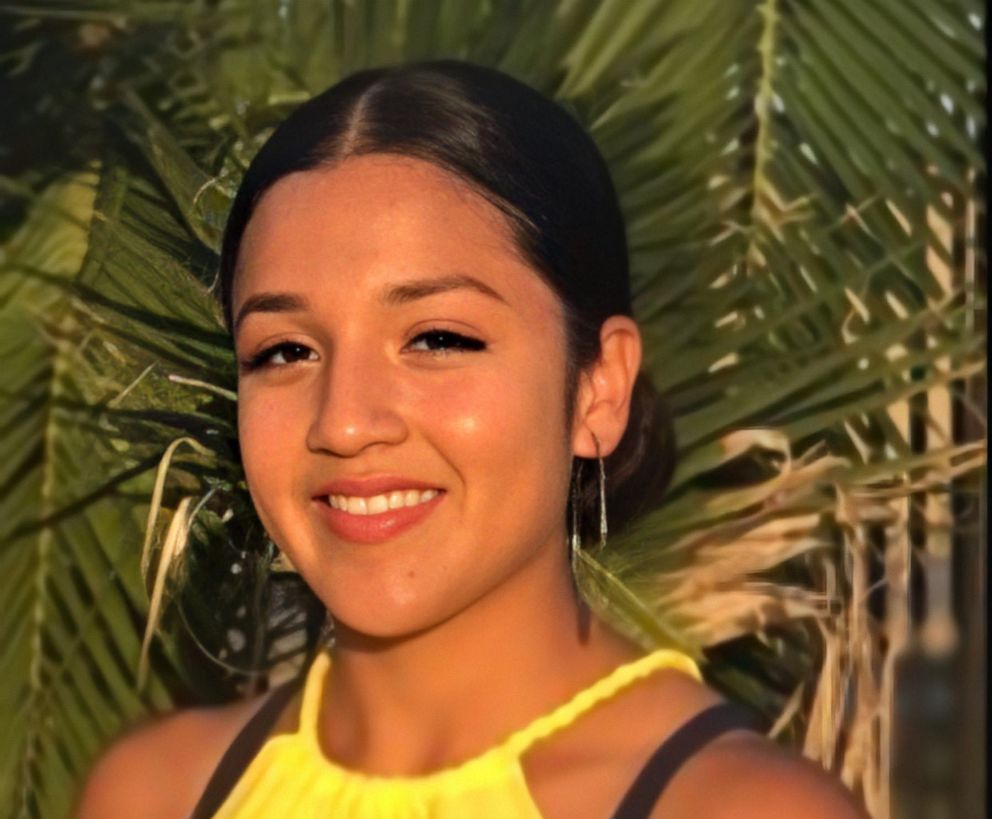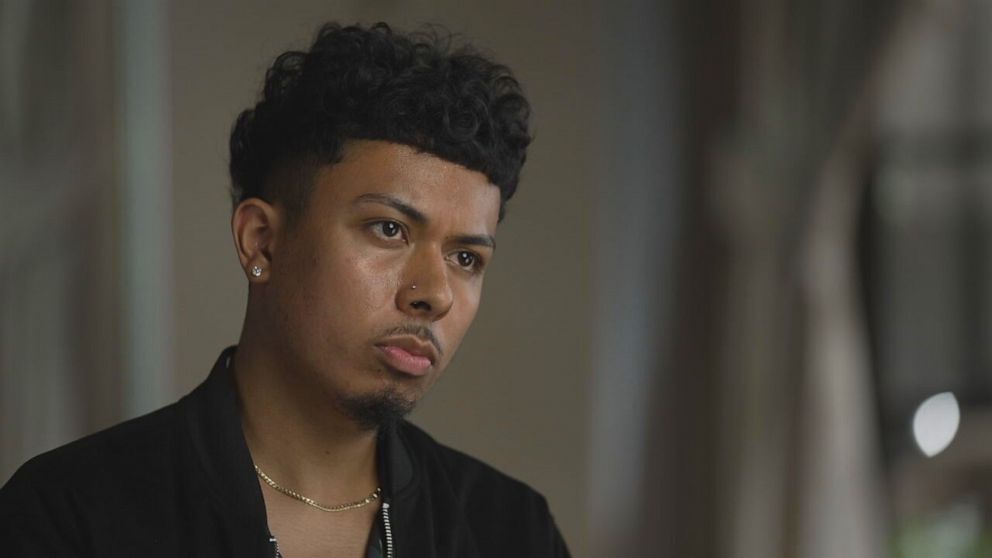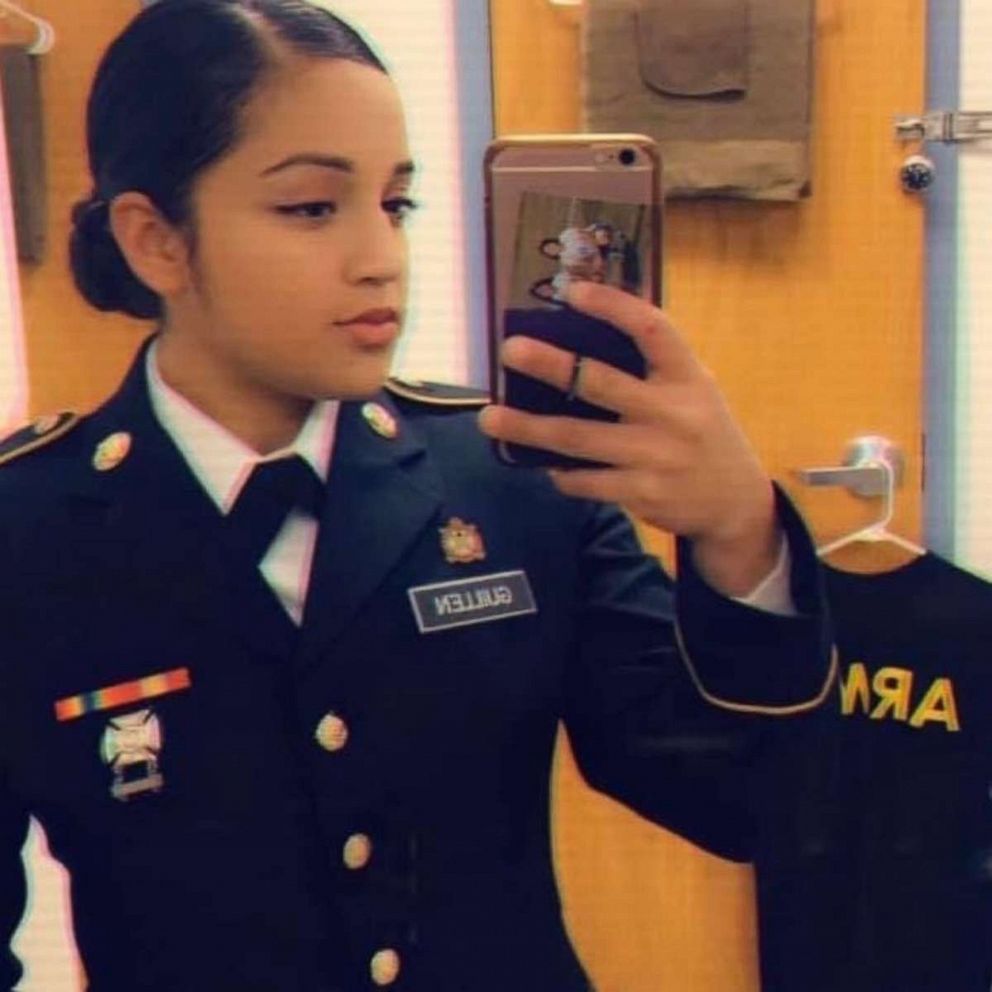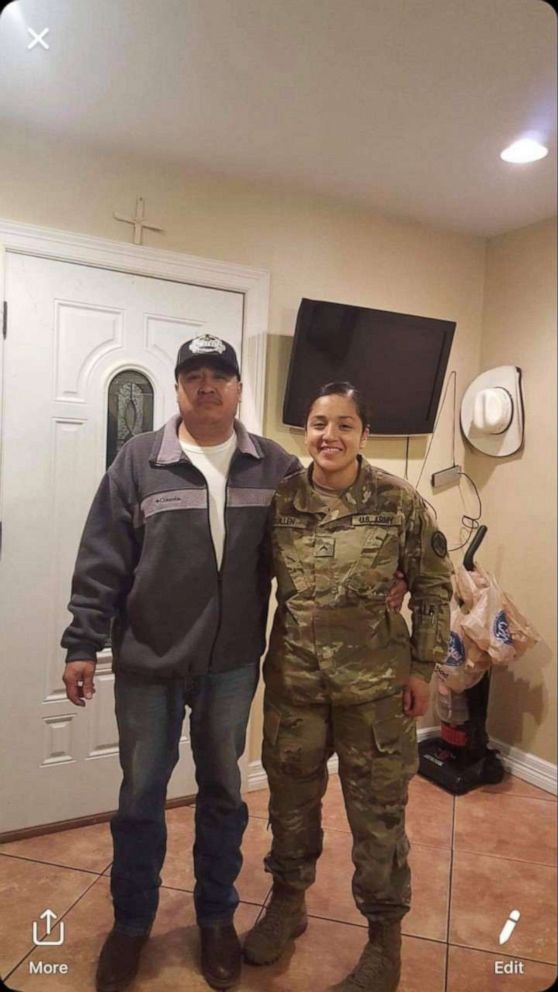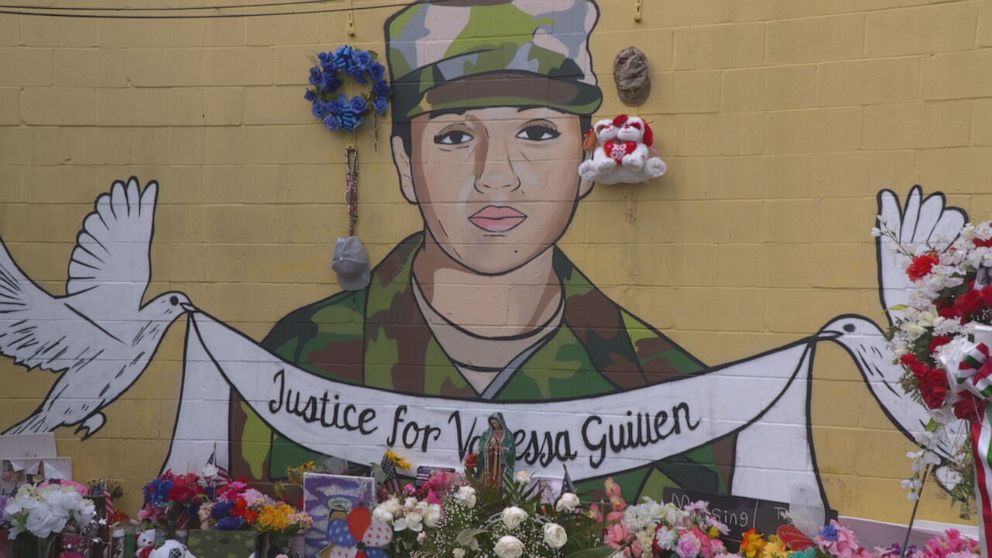Vanessa Guillen's fiance speaks out in 1st national TV interview since her death: 'They failed us'
Watch the full story on "20/20" TONIGHT at 9 p.m. ET on ABC.

HOUSTON -- Vanessa Guillen will forever be 20 years old, engaged but will never be married. She was murdered, inside one of the Army's largest military installations. Later, the world learned that she had told her mother she was sexually harassed on the base.
In the last year, her name has become a rallying cry for women's safety and military reform. Her family is still looking for answers as to why she was killed, and how her murderer escaped justice.
Watch the full story on "20/20" TONIGHT at 9 p.m. ET on ABC.
Born and raised in Houston to immigrants from Mexico, Guillen was one of six children. Guillen's family says she had dreamed of serving her country in the military since she was a child. She attended her first Army training in June 2018 and was later stationed at Fort Hood, Texas, making the three hour drive back to Houston every weekend to see her family.
Ryan "Cj" Landy, a fellow soldier in her unit, told "20/20" that he and Guillen became friends "immediately" after she arrived. He remembered helping her with weightlifting and she helped him work on squats and deadlifts.
"She didn't talk to too many people," Landy told "20/20." "But, I guess, apparently I'm kind of funny sometimes, and she'd crack up all the time. Like, her laugh was very, very contagious."

Betavious "Tay" Hightower was another one of Guillen's "closest friends," he said. "Sometimes we'll go run, like, 3 miles or a few miles. And she would always beat me."
Guillen's loved ones say she had always been a fitness fanatic. Her fiancé Juan Cruz, who proposed to her in March 2020, said that she had remarkable strength -- so much so that she could carry him on her shoulders.
"When Houston went on lockdown [for COVID-19], she was really frustrated because the gyms were closed. She would be like, 'Let me carry you so I can do squats,'" said Cruz.
Cruz saw the woman he planned to marry for the last time on April 19, 2020, three days before she went missing.
"She told me, 'I love you. Goodnight,'" he said. "Then, the next day, she woke up, like, at 5 in the morning to leave to Fort Hood... I was still asleep but I remember she gave me a kiss and she left."
Vanessa Guillen vanishes
Hightower planned to go hiking with Guillen on Wednesday, April 22, 2020, the day she went missing.
"The plan was to go hiking whenever she got off work," he said. "She had suspected it was gonna be a half-day. The last time she texted me was that morning, and she just sent a screenshot with the weather. It said it was gonna rain."
Last year, Army Maj. Gen. Donna Martin told "20/20" that investigators had found that Guillen had reported to her work station in the motor pool that morning. Martin said she went to the arms room, where she left her bank card, her ID card and the keys to her barracks room and car.
At 10:23 a.m., Guillen sent a text message confirming the serial number of a machine gun. It's her last known communication. At 6 p.m, Hightower says he went looking for her.
"I went to her room and her roommate answered the door," he said. "I asked, 'Have you seen Guillen?' And she said no. So I went back outside and I walked to the parking lot, and I saw her Jeep there. At that time, I suspected something was up."
Hightower told Landy that Vanessa was missing. Landy said he grabbed his keys and the two went out searching "almost around the whole base."
"We were in my car at the time," Landy said, "and we went to the track that she usually would be at, just in case she didn't really wanna talk to anybody and wanted to get stuff off her mind. We drove the route she [would] usually run up the road on base ... which was 2 miles away from the barracks. We went to the motor pool [to] see if maybe she got locked in."
Guillen's Army friends weren't the only ones worried about her disappearance. She hadn't been responding to texts or calls from family, either, and as day turned to night, Cruz and Vanessa's sister, Mayra Guillen, drove to Fort Hood.
"I knew something was wrong because I'd check her social media," Cruz said. "I was like, 'Man, I hopefully [will] see a tweet or something. I was just checking, but nothing."
"On my way there, I was just crying because I couldn't understand it," Mayra Guillen said. "I didn't wanna think the worst, but [I was experiencing] a lotta panic."
They arrived after midnight and Mayra says they were told by the staff sergeant to come back in the morning.
Hightower said that at around 10 p.m., he found out that the last person she'd worked with in the arms room was Spc. Aaron Robinson. Vanessa Guillen was a private first class, so he technically ranked above her, though she was about to also become a specialist.
"I called [Robinson], and he was acting like he just woke up," Hightower said. "He said he didn't talk to her while he was in there."
Landy said Robinson acted "upset" that everybody kept "blowing up his phone."
The next 24 hours
Landy said he knew word had gotten out about Vanessa Guillen's disappearance when he saw the military police at Fort Hood the next morning.
Martin said Fort Hood authorities contacted the military police, who got in touch with local police, then brought in the U.S. Army Criminal Investigative Division (CID).
Hightower said that as they investigated her disappearance, he began to hear rumors circulating around the base about what had happened to his friend, including that she had been kidnapped at a church and that someone had taken her three hours away.
"It was so many rumors, we didn't know what to believe," Hightower said.
Meanwhile, Cruz and Vanessa's sisters were desperately trying to spread word of her disappearance on their own.
"I [was] going to the gas stations, to stores, to the [bus stops] posting missing [signs] ... like [for] the love of my life. It's a nightmare," Cruz said. In an interview with KXXV, a local television station in Killeen, Cruz said, "She was just gone, so she just disappeared. Every minute that passes is killing me inside, slowly."
Landy said that because Robinson was the last person to be seen with her, a superior asked Robinson "in front of everybody" about their last interaction.
"[Robinson] was like, 'Oh, I kept it professional; didn't say too much to her.' But like I said, the night before, he had told us that he didn't say anything to her at all," Landy said.
The trail goes cold
After two days, the Army officially marked Vanessa Guillen as AWOL, or absent without official leave. At the time, there was not a missing soldier protocol in place.
Investigators spoke with Robinson, who said that Vanessa Guillen had left his arms room after completing a task. He said he then went to spend the night with his girlfriend, Cecily Aguilar, off the base. Investigators said Aguilar backed up his alibi.
The Army's Chief of Staff for the U.S. Army Forces Command.Maj. Gen. Gene LeBoeuf told "20/20" in an exclusive interview that there were several factors that threw off the investigation in its early stages. Her disappearance happened at the height of the COVID-19 pandemic, while "everybody's sheltering," he said, so "we had very few soldiers moving about."
Some of the soldiers who were around gave investigators bad information, he said.
"[The] first error was with respect to eye witness reports," LeBoeuf said. "Three separate soldiers had indicated that they had seen Specialist Vanessa Guillen departing the arms room and moving towards a motor pool area where vehicles are maintained." This led investigators to search away from the actual scene of the crime.
Also, at 4 p.m. that day, she "was mistakenly marked present," he said.
On May 18, nearly a month after Vanessa Guillen's disappearance, investigators spoke to two witnesses who said they saw Robinson exiting the arms room on April 22 with a large case called a tough box, which they say he loaded into his car before driving away.
Investigators spoke to Robinson again and he let them search his phone.
"We were interviewing other people in the unit as well to find out, was there a relationship between Vanessa and Spc. Robinson that we didn't know about? And there was none," Martin said.
The Guillen family sought help from attorney Natalie Khawam, who has experience with cases involving the military.
Vanessa's mother Gloria Guillen said that her daughter had confided in her that she was being sexually harassed at Fort Hood but that she didn't report it due to fear of retribution and retaliation. Vanessa Guillen also spoke about it with her friends.
"As close of friends as we were, she came to us about a lot of different stuff. ... We were kind of aware [of] what was going on," Landy said. "I didn't force her to do anything she didn't wanna do. I just suggested to her, I was like, 'I can talk to this individual for you, or, you know, see what route we can take about this.' But it wasn't too much I can do."
When Gloria Guillen spoke publicly to the media about her daughter's sexual harassment, the case exploded onto the national news scene.
On June 18, two months after Vanessa Guillen vanished, authorities found skeletal remains close to the base in Killeen. Investigators quickly determined that the remains were too old to be Guillen's.
They eventually identified the remains as missing Fort Hood soldier Gregory Morales, who'd gone missing in August 2019, almost a year prior. Morales had been listed as a deserter, but now the Army says foul play is suspected. His death is still under investigation.
Investigators spoke to over 300 soldiers in Vanessa Guillen's unit, including Hightower.
"We got harassed. They just kept trying to pin it on me or Landy," Hightower said. "There was one time they brought me in and they were asking questions: have I ever found her attractive, and have I ever tried her? Have I ever liked her? They were like, 'Maybe you did go hiking with her, and maybe you did actually rape her and leave her out there. And that's probably what happened to her.' And they were just trying to see my reaction."
Landy said it was frustrating that investigators were seemingly not suspicious of Robinson.
"We told them who to investigate from the beginning, and that's not what happened. So, I feel like they should've came to that conclusion way earlier than they had."
Maj. Gen. Gene LeBoeuf, Chief of Staff for the U.S. Army Forces Command, however, insisted that "Specialist Robinson was a person of interest early on in the investigation. He was questioned within two days of the criminal investigation...He was questioned very early on in this process."
Investigators later learned Robinson's phone pinged in Belton, Texas, by a bridge near the Leon River, about a 30 minutes away from base in the early morning hours after Vanessa vanished.
Investigators went to the location and found a burn pile, which included a tough box that had not burned completely.
The pile went 3 feet into the ground and the dirt was fresh, but investigators did not find any human remains, said Tim Miller, who helped lead the search with his organization EquuSearch. Investigators brought a cadaver dog, which signaled that a body might have been thrown in the water.
Looking at his phone records, investigators also found that Robinson had called Aguilar multiple times during the night after Vanessa Guillen went missing. When they spoke to Aguilar, investigators said she claimed he was calling that night because she couldn't find her phone.
Two months after Vanessa Guillen's disappearance, leadership at Fort Hood held a press conference where they announced that investigators believed that foul play was involved in her disappearance.
"I was like, 'About time they said it,'" Cruz said. "We been knowing since when it first happened because nothing makes sense. Nothing."
WATCH: Vanessa Guillen: Remember Her Name

Hope is lost
Investigators and volunteers had searched along the Leon River without success. But on June 30, 2020, contractors working on a fence came upon a horrific odor in the same area. They called local sheriffs out to the area; the Texas Rangers and Fort Hood CID soon followed.
Investigators discovered human remains which had been buried and covered in concrete. While the remains had been mostly obscured, there was a lock of hair that was sticking out.
Investigators found remains in three separate shallow graves, each concealed with cement.
"I got a call from CID on June 30th," Mayra Guillen said. "They just told me, 'We did find the partial human remains.' And this time they didn't tell me, 'It's not her.'" She got a second call from Miller, who helped in the search.
"I said, 'Vanessa's been found,'" he remembered. "There was a lot of silence after that one. A lot of silence."
Mayra Guillen said she "couldn't believe it."
"The way that he knew that it was Vanessa was because he described her hair to me. And I just dropped my phone and it was just like everything came to an end," she said.
Landy said he found out his friend's remains had been found from a news article.
"She didn't deserve any of that. She never did anything to anybody to deserve what happened to her at all."
Later that night, Army investigators questioned Aguilar, they say she admitted that Robinson had told her he killed Vanessa Guillen and that she saw her remains in the tough box that he had carted out of the arms room, where he told her he killed Guillen.
According to a criminal complaint that details what investigators believe happened to Guillen, Aguilar said she drove with Robinson to the Leon River where they tried to dispose of the body. Investigators said she told them she and Robinson dismembered the body and dug three separate graves, then came back two days later to cover them with concrete.
Investigators kept Robinson under watch in a conference room for hours at Fort Hood but didn't tell him why. Soldiers were tasked with watching Robinson in shifts. While there, he was allowed to talk on his cell phone to Aguilar, who was with investigators and agreed to let them record the calls. In the calls, Robinson didn't deny anything. According to investigators, he even texted her links to news articles about the remains discovered near the Leon River.
At around 10 p.m., he was heard talking on the phone, apparently to his mother, saying "don't believe what you hear about me." Then, he raced out of the room.
A guard gave chase but Robinson was able to get into a car and leave the base. Aguilar helped authorities pinpoint his location so that he could be arrested. About two hours later, In the middle of a street, authorities converged on Robinson, who pulled out a gun and shot himself dead.
When asked about why it took two hours to track him down, and how Robinson got a gun, LaBoeuf said "We want answers to that too. And that's what the criminal investigation is seeking answers to as well."
Killeen Police have body camera video and dashcam video from the incident but none of it has been released. The Guillen family's lawyer is pushing for the evidence to be published to see if any more information could be gleaned from Robinson's final moments.
"[I was] angry and sad at the same time, because he was in our face the whole time," Hightower said. "We suspected him. We tried to tell them that it was this person, and he was just walking around like nothing happened. And he was around us, too. And it's like we could have did something, but we didn't know."
Vanessa's legacy
Aguilar was charged with conspiracy to hide and destroy evidence in connection to Vanessa Guillen's death and was denied bond on July 14, 2020. Aguilar's lawyers have filed a motion to throw out the entire case and another motion to suppress the statements officers say she made. She has pleaded not guilty to charges.
The Secretary of the Army at the time of Vanessa Guillen's disappearance, Ryan McCarthy, created an independent review panel, including investigators, lawyers and retired FBI agents, to look at the command climate at Fort Hood.
The findings of the committee identified major flaws with the sexual harassment and assault response prevention (SHARP) program at the base, fundamental issues with Fort Hood Criminal Investigation Command field office activities, and a command climate at Fort Hood that was permissive of sexual harassment and sexual assault.
"Nothing really can bring her back at all but as long as we know how to honor her name and how to make this change, I feel like that would be some closure for us," Mayra Guillen said.
The "I Am Vanessa Guillen" bill, would explicitly list sexual harassment as a crime in military law, require the secretary of defense to establish a process for servicemembers to lodge a complaint confidentially and move the decision of whether to prosecute a sexual offense to an special prosecutor outside the chain of command.
"It's one of the biggest military reforms in history," Vanessa Guillen's other sister, Lupe Guillen, said. "It's so important because it will bring the help my sister never obtained, it will bring the voice my sister never had."
On April 30, 2021, the Army announced that it had found Guillen had been sexually harassed by a superior, but that superior was not Robinson. The Army said leadership failed to take appropriate action.
LaBoeuf revealed in an interview with "20/20" that she was "sexually harassed on two separate occasions by the same soldier" -- someone who was her superior. LaBoeuf said he was "in Specialist Guillen's chain of command... somebody that-- that had responsibility, a leadership role over Specialist Guillen."
He added that the Army cannot release his name "for the matter of privacy" and is "part of the investigation and the process."
He said that person, along with 20 others, are in the process of "being held accountable." He said 11 have been removed from their positions permanently, and all 21 have "black marks" on their records "that will stay with them." It is unclear whether the person who harassed Guillen will be prosecuted at this time.
"I was astonished that they had so much information and details. The only sad part was that they were protecting the identities and names of the perpetrators," Khawam said. She questioned the Army's conclusion that Robinson did not harass Vanessa Guillen. "So he can murder her but he wouldn't sexually harass her. ... That's below him? And if he did not sexually harass her, let's just play that part, well then why the heck would he bludgeon her to death?"
Chris Swecker, a former leader in the FBI who helped lead the independent review panel at Fort Hood, said that even though the command investigation found "no evidence that Spc. Robinson harassed Spc. Guillen, that's not to say on the morning of her murder that he wasn't in the in the act of assaulting or harassing her. But, prior to that, there's no evidence whatsoever that Spc. Robinson harassed her."
The Guillen family wants more answers, too.
"Can you try to investigate even further as to why this was committed? Why? Why? Just why?" Mayra Guillen said.
That's [what] we want to have that answered as well. And that's exactly what the criminal investigation is about," LaBoeuf said. "We need to know exactly what went on in that arms room. We need to know exactly why it happened. The family deserves these answers."
On the eve of the one-year anniversary of Vanessa Guillen's murder, the Army dedicated a gate to her memory at Fort Hood.
"That entrance leads to [the] 3rd Calvary Regiment," Lupe Guillen said. "That's the regiment Vanessa used to work, and everyone that passes through that gate will see my sister's name, my sister's picture and remind themselves about how sexual harassment and assault has to be taken seriously, and about the way she was murdered because no one deserves that."
Cruz said he thinks often about his late fiancée.
"Memories never die," he said. "It just seems like a nightmare when I drive through Houston. I see her murals and I say to myself, 'Damn, this is reality. She's no longer here.' On the other hand, murals aren't made for just anyone. That brought me a bit of peace to my heart."


